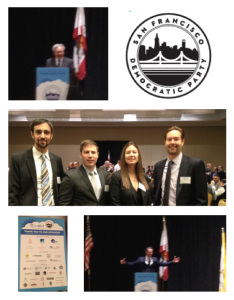David Talbot and Jason Benlevi sit down with Rose Aguilar on KALW’s “It’s Your Call” to discuss the impact of sharing economy “disruption” and the tech boom in general on San Francisco’s housing market.
Planning Commission “Figures Out” that It Can Impose Interim Controls on Market Rate Housing Developments
The “Mission Moratorium” failed to pass last month as an interim emergency ordinance and is headed to the ballot for November. However, it may have found new life in the meantime. The Planning Commission “figured out” that it can impose interim controls that would impose additional scrutiny on proposed developments – especially those that would demolish rent-controlled housing or community centers.
As for how to actually implement such a scheme, divorced from the emotion of the last effort, Commissioner Dennis Richards explained, “None of us are running for office or grandstanding… We can actually have a more rational discussion here”.
New State Law on Installation of Electric Car Charging Port for Renters
California Civil Code §1947.6 goes into effect this week. For residential leases entered, extended or renewed as of July 1st, landlords will have to make certain accommodations to tenants with electric vehicles, to allow them to charge on-site. This section was added to the Civil Code by A.B. 2565 last year, which also added a companion statute – section 1952.7 – that prohibits unreasonable limitations on electric car charging ports for commercial tenancies as of January 1st.
The full text of the new statutes is below:
Continue reading “New State Law on Installation of Electric Car Charging Port for Renters”
Bay Area Homes Now Selling for Millions Over Listing
San Francisco Business Times reports that at least ten homes last year sold for at least a million over asking in San Francisco (with another 19 meeting this mark between Santa Clara and San Mateo counties).
The Business Times attributes this to the confluence of low inventory and the recent influx of “funny money” (i.e., the wealth of overnight multimillionaires), leading many agents to adopt “a strategy of egregious underpricing”.
Zacks & Freedman, P.C. Attends Breakfast with San Francisco Democratic Party
Horne v. Department of Agriculture: No More Taking Raisins Without Just Compensation
This week, the United States Supreme Court found that the United States Department of Agriculture could not take a portion of California raising growers’ crop for a market stabilization program without paying just compensation under the Takings Clause of the United States Constitution.
The Hornes, California raising growers, were required to set aside a portion of their crop under the Department of Agriculture’s “marketing order”. The marketing order called for raisin growers to set aside as much as 47% of their crop in a particular year. These raisins would then be allocated to best stabilize the market. If they were sold, profits would be returned to the Hornes. But often, the raisins were just given away.
The Hornes argued that the reserve requirement constituted a taking of their property, for which the Constitution requires just compensation. The Ninth Circuit Court of Appeals agreed, but on the basis that it was an unconstitutional condition, where the government “imposed a condition (the reserve requirement) in exchange for a Government benefit (an orderly raisin market)”. This doctrine emerged out of land-use cases, where local governments have significant discretionary authority over authorizing permits and can condition the granting of a permit on certain conditions, so long as the conditions have a “rough proportionality” to and “essential nexus” with the impact of a proposed development. If they do not, the condition is an unconstitutional taking.
The application of this doctrine to the raisin reserve requirement feels a bit forced (as it did in the recent decision of the U.S. District Court for the Northern District of California, concerning enhanced relocation payments for tenants displaced by the Ellis Act). The allocation of personal property for a broader public purpose is a deprivation of rights, and this doctrine – mixed with some analytical gymnastics to find the existence of a discretionary benefit – allows recourse for the property owner.
The Supreme Court streamlined the takings analysis by expanding the application of “per se taking” jurisprudence to personal property: “Nothing in the text or history of the Takings Clause, or our precedents, suggests that the [per se] rule is any different when it comes to appropriation of personal property. The Government has a categorical duty to pay just compensation when it takes your car, just as when it takes your home.”
Flatbook: Airbnb of Sublets?
Curbed reports on Flatbook, a company that is trying to become the “Airbnb of subletting” by “creating a network of apartments under a central company”, which would fill a space, in an industry dominated by Airbnb, for regular sublets and a temporary stays for travelers. That is, of course, unless your Airbnb guest keeps reserving your apartment, in which case Airbnb is the Airbnb of subletting.
Proposed Legislation Would Tighten Eviction Protections in Rent Ordinance
Last week, the Board of Supervisors, led by Supervisor Kim, proposed legislation that would make several significant changes to the Rent Ordinance, providing clarity to some of the more vague articulations of tenant protections and also imposing some onerous burdens on landlords. For instance, while a termination notice must claim authority under one of the Rent Ordinance’s “just causes” for eviction, landlords would be required to state that the particular just cause is her “dominate motive” in terminating the tenancy. (No clarification on what happens if the landlord has two reasons.) Another would require landlords terminating tenancies under the Ellis Act to inform tenants of their rights to re-rent from successors-in-interest, as well as the current owners, if their units are ever placed back on the rental market. As Ellis Act termination notices generally take one year to ripen, this change could potentially void notices already in the pipeline.
The proposed amendment would also add a substantive change that would clarify the blurry line between municipal ordinances and Costa-Hawkins. The language of Costa-Hawkins provides that, where an existing tenancy is terminated following service of a (non-fault) termination notice or a notice of change to terms in tenancy, the unit loses its “de-control” status, and it becomes subject to rent increase limitations. This language was most likely included in the mid-90s so that there would not be a big rush to empty out rental units that were de-controlled-as-such, but which were grandfathered in by the existing rent-controlled tenancies that pre-dated Costa-Hawkins. In other words, the intent of the grandfathering provision was probably just to buffer the current tenancy, not to regulate subsequent tenancies in de-controlled units. And, while this is the stated interpretation of the Rent Board (see, AT150049), it is not supported by the plain language of Costa-Hawkins, which does not qualify the conditional protection. The proposed law would explicitly state that all new tenancies following a landlord’s notice would be subject to rent control, not simply the one immediately following the grandfathered tenancy.
Curbed SF Continues To Explore How You Probably Can’t Afford To Live Here
Curbed SF – faithful digester of Zillow housing data – determines that a household would need to earn $126,480 per year – or $63.24 per hour – to be able to live anywhere in the Bay Area. (That number is $175,760 per year, or $84.50 per hour, for San Francisco specifically.) That would be considered “unaffordable” by the common measure of spending more than 30% of income on household expenses.
Curbed notes that these numbers are based on median rental values, and low-income earners generally don’t rent at median rates an any city. That said, Curbed has previously noted that, even where the exact numbers that emerge from these kinds of data are not necessarily accurate, their changes over time are, and this represents an increase of roughly 15% since the end of last year for San Francisco. The good news? This picture presents an elegant solution: just earn more money.
City May Subsidize Historic Local Businesses
In another “first of its kind in the country” regulation of land use, Supervisor Campos has proposed a ballot measure to allow the City’s “legacy business fund” to support local small businesses distinguished by the Historic Preservation Commission.
The City’s contribution is in the form of a “grant” for older businesses up for lease renewals (of up to $22,500 per year), so it probably does not run afoul of California’s underdeveloped state-wide prohibition of commercial rent control.








